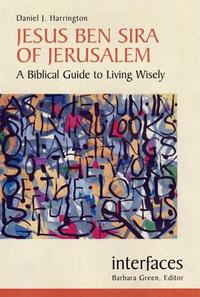The Joyful “Fear of the Lord:” Living Faithfully in the time of Jesus … and our Own
Author: Bobby Valentine | Filed under: Apocrypha, Discipleship, Jesus, Jewish Backgrounds, Journey, Sirach, Spiritual Disciplines
Sirach was a work of immense importance both in Judaism and Christianity. The are mountains of literature on the book. Harrington’s small volume is a wonderful guide to this important book. If you are looking for a place to get your toes wet and perhaps digest some Sirach in a work designed for personal biblical study, then Harrington cannot be beat.
“The fear of the Lord is glory and exultation,
and gladness and a crown of rejoicing” (Sirach 1.12)
Introduction
For many people the expression “fear of the Lord” carries very negative connotations. For some it calls to mind the gross caricatures of the supposed vengeful, and angry, “God of the Old Testament.” One of my most enduring Spiritual mentors so badly misinterpreted the phrase that he thought it literally meant ancient Israelites and Jews were “afraid of God.” Such understanding did not come from reading the Hebrew Bible or talking to any Jew.
In recent times, however, there may be a lack of any kind of “fear of the Lord.”
But what does the idea mean and why is it important for Christians?
Contrary to common misunderstanding, within the biblical worldview the “fear of the Lord” is a marvelous perspective on life. Indeed it is a multifaceted prism referring to respect and sheer gratitude as a way of life that is directed to an incredibly majestic, glorious, and merciful God who has bestows the gift of life and given the gift of his torah to live life abundantly. In short the phrase means something like living within an open and exclusive relationship with the Creator God.
It is a subjective response to the objective majesty of the Holy One of Israel. In the area of the Philosophy of Religion the “fear of the Lord” may correspond to the what Rudolf Otto called“myterium tremendum et fascinans” …“the mystery that both frightens and fascinates” but is more. I am certain that the biblical sages would give a nod of approval to Otto’s perspective. God is Awe-some.
The fear of the Lord is an orientation that is inculcated and nurtured through the “wisdom” literature in Israel in works like Proverbs and in the deutrocanonical books Sirach and Wisdom of Solomon. This orientation of a God directed life pervades the time of Jesus. Sometimes visiting books in the Apocrypha can shed great light on biblical themes in particular and also help us see Jesus more clearly and more faithfully. A Sage of Jerusalem is one that we will talk to today. I have written elsewhere a more comprehensive introduction to Sirach as a whole here: Sirach: Wisdom is Obeying God’s Word. Today’s blog is focused on one theme.
Enter Jesus the Son of Sirach of Jerusalem
For Jews in the time of Jesus of Nazareth the “fear of the Lord” was anything but a negative concept. One who opens a wide window for our understanding is Jesus ben Sira of Jerusalem, whose teachings are preserved in the deuterocanonical book, Sirach. For Ben Sira wisdom cannot exist without the fear of the Lord.
Sirach opens with a reflection on the divine origin of wisdom (1.1-10) as a gift to humans. The proper response to this gift is the fear of the Lord (1.11-20). This fear of the Lord is an occasion of joy!
“The fear of the Lord is glory and exultation,
and gladness and a crown of rejoicing.
The fear of the Lord delights the heart,
and gives gladness and joy and long life”
(Sirach 1.11-12)
Jesus, the son of Sirach, then reminds us that the “beginning of wisdom” is fear of the Lord (1.14-15). But the fear of the Lord is not only the beginning of wisdom, but it is the fullness of wisdom.
In a powerful metaphor, we are told those who fear the Lord will be drunk with wisdom, “To fear the Lord is fullness of wisdom; she inebriates humanity with her fruits” (1.16).
Sirach is not done with his praise for living in fear of the Lord. Rather he goes on to proclaim that it is also the “crown of wisdom” issuing in a life of shalom (1.18) and “root of wisdom” (1.20) that leads to a good life. Without a proper disposition to God it is impossible to receive the wisdom that flows from the Holy One of Israel.
The Fear of the Lord and Testing
Sirach is careful not to turn the fear of the Lord into some perverse health and wealth gospel of prosperity so common among Western fundamentalists. Since the fear of the Lord is the beginning, fullness, crown and root of wisdom, those living in such wisdom know that suffering is often found on a journey with God.
In fact Sirach point blank warns, like the apostle Paul (2 Tim 3.12), at the very beginning “my child when you come to serve the Lord, prepare yourself for testing” (2.1). Thus the “fear of the Lord” is no magical incantation. Rather with this warning, Jesus Ben Sira of Jerusalem places the suffering of his disciples in the category of “discipline”or “instruction” as do other Jewish biblical theologians (e.g. Proverbs 3.11-12 and Hebrews 12.5-6).
If artisans and athletes must constantly practice and work very hard not only to learn their craft but to maintain the level of performance of yesterday then those who seek God’s wisdom must do the same. Ben Sira makes this point with the common biblical metaphor of gold being “tested in the fire.”
“For gold is tested in the fire, and those found acceptable, in the furnace of humiliation.
Trust in him, and he will help you; make your ways straight and hope in him” (2.5-6)
Only a fool will imagine themselves exempt from testing. Rather we expect it! Then proper orientation of life is enduring prayer, patience and hope in the God of Israel who is not only Holy but infinitely loving, gracious and merciful. In such a prayerful posture we hope in the time of trial (sounds pretty NT doesn’t it, it should because it is pretty “Old Testament!!). This is living in the “fear of the Lord.”
“You who fear the Lord, wait for his mercy; do not stray, or else you may fall. You who fear the Lord, trust in him … Consider the generations of old and see: has anyone trusted in the Lord and been disappointed? Or has anyone persevered in the fear of the Lord and been forsaken? Or has anyone called upon him and been neglected? For the Lord is compassionate and merciful; he forgives sins and saves in time of distress” (2.7-11)
Sirach roots his doctrine of the fear of the Lord in the character of the God who reveals himself in Exodus 34.6-7 (clearly visible in 2.11). It is faith in the character of God that sustains those with the “fear of the Lord” within their heart. Even in times of testing we live in humble faith, trusting obedience and worship, for the God of Sirach is considerably different than the gods of Homer.
“Those who fear the Lord seek to please him, and those who love him are filled with his law. Those who fear the Lord prepare their hearts, and humble themselves before him … for equal to his majesty is his mercy, and equal to his name are his works”(2.16-18)
“We could say more but could never say enough; let the final word be: ‘He is the all!’” (43.27)
That is a great perspective on all life that is lived under the sun. It explodes many myths about Judaism in Jesus day but also challenges us even today in our conception of who God is.
 Wrapping up: The Joy of the Fear of the Lord
Wrapping up: The Joy of the Fear of the Lord
Sirach, like all the sages, knows that suffering and other inexplicable things are in our world. But for those who are wise there is a fundamental orientation on life itself that places all things within a matrix or context for understanding and living.
For the biblically minded, this is none other than the “fear of the Lord.” The fear of the Lord actually protects our attitudes and hearts from bitterness in life. The fear of the Lord bears fruit in a joyful, exultant, worshipful life before the Creator God. Jesus, the Sage of Jerusalem, sums it up like this,
“Happy (blessed!!??) is the soul that fears the Lord!” (Sirach 34.17)
No wonder Jesus of Nazareth liked the one called the “first theologian” in the Jewish tradition. May we all live, like Jesus of Jerusalem and Jesus of Nazareth, in the joyful fear of the Lord. The fear of the Lord is simply living joyfully in the wisdom of God.
April 25th, 2016 at 11:38 am
Thanks for this post. I find it so great how often you refer to and use Sirach in your posts. It’s such a fantastically amazing book of wisdom. It is so sad that it was removed from our Bibles. Thanks again!
April 25th, 2016 at 7:11 pm
Thank you Andrew. Sirach is indeed a fantastic book. You will find material on all the Apocrypha on my blog too.
April 26th, 2016 at 6:21 am
From my friend Dr. Brandon Frendenburg, “Bobby, thank you for this wonderful article. Well put!”